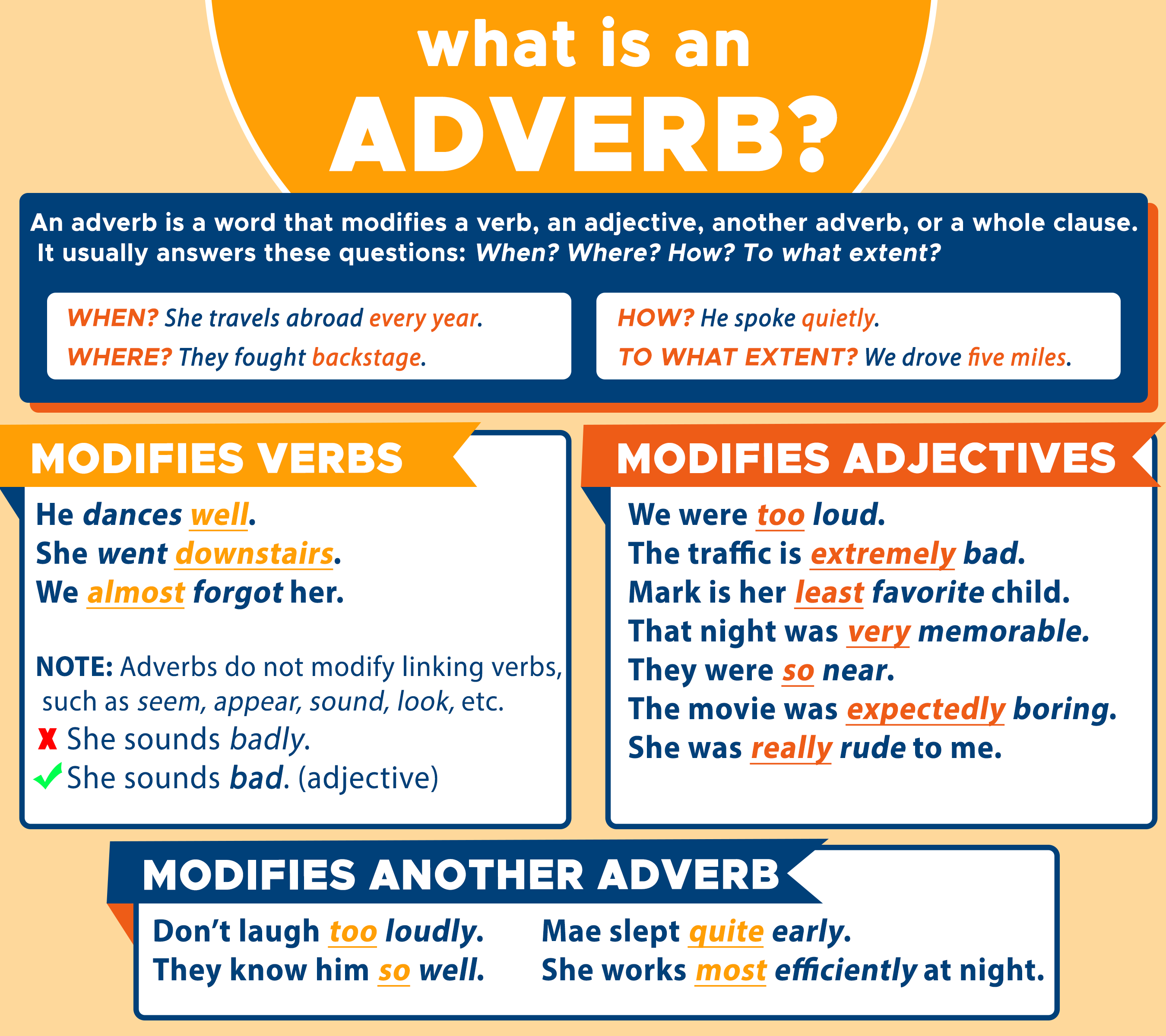Let’s learn how to define and use an adverb.
What is an Adverb?
An adverb is a word that modifies a verb (he walks slowly), an adjective (it’s quite dirty), another adverb (she arrived very early), or a whole clause (Luckily, he survived the fall). We’re used to adverbs ending in -ly but note that they sometimes take the form of adjectives (I feel bad).
An adverb usually answers any of these questions: Where? When? How? To what extent (how much or how long)?
WHEN? Good moments happen every time you’re around.
WHERE? The police are parked nearby.
HOW? Suddenly, everything changed.TO WHAT
EXTENT? I barely remember what happened.

Related Reading: Adverb Phrase – Phrase Modifying Another Word
Adverbs Modify Verbs
An adverb is most commonly used to describe verbs and, in such cases, you can easily track it.
Learn how an adverb (in bold) expounds the meaning of the verb (italicized) modified.
- The students who listened carefully during the class got the highest grades. [The adverb carefully tells how the students listened.]
- He loved her wholeheartedly, but it wasn’t enough. [The adverb wholeheartedly tells how or how much he loved her.]
- We rarely visit Mom but we video chat often. [The adverb rarely modifies the verb visit, while the adverb often modifies the verb video chat.]
- She easily falls for men who never intend to keep her. [The adverb easily modifies the verb falls, while the adverb never modifies the verb intend.]
NOTE: Adverbs do not normally modify linking verbs which mostly require adjectives. Examples of linking verbs are seem, appear, look, feel, become, smell, sound, taste, remain, and stay.
Wrong: She sounds tiredly. [Using the adverb tiredly is incorrect. Remember that adverbs tell how you perform an action, while adjectives describe what you feel, smell, or sound.]
Correct: She sounds tired. [The adjective tired modifies the noun she; they are connected by the linking verb sounds.]
Adverbs Modify Adjectives
Adverbs are also used to elaborate and emphasize what adjectives mean. Notice the difference between a moderately easy exam and a very easy exam.
Learn how adverbs (in bold) modify adjectives (italicized) to make descriptions more effective.
- He is an extremely talented singer. [The adjective talented modifies the noun singer; the adverb extremely modifies the adjective talented or tells how talented the singer was.]
- His undeniably beautiful sister got married last week. [The adjective beautiful modifies the noun sister; the adverb undeniably modifies the adjective beautiful or tells how beautiful the sister was.]
- Her quite childish behavior annoys us. [The adjective childish modifies the noun behavior; the adverb quite modifies the adjective childish or tells how childish the behavior was.]
Here are more examples of adverbs modifying adjectives.
- Are there too many people on Earth?
- Wow! That’s an almost impossible achievement!
- Don’t waste your hard-earned money on that unreasonably expensive phone.
- The book is more magical than its movie adaptation.
Adverbs Modify Another Adverb
Less frequently, an adverb (in bold) modifies another adverb (italicized).
- He revealed the secret too early. [The adverb early modifies the verb revealed while another adverb too modifies the adverb early to tell how early he revealed the secret.]
- They were arguing quite often. [The adverb often modifies the verb arguing while another adverb quite modifies the adverb often to tell how often they were arguing.]
Here are more examples of adverbs modifying another adverb.
- She sang too loudly and woke me up.
- I thought I knew him so well, but I was wrong.
- She works most efficiently during the wee hours.
- He delivered the package unusually fast.
Exercise:
Each of the sentences below contains at least one adverb. Make a list of the adverb/s in order of their appearance in the sentence, then write the word or group of words the adverb modifies.
EXAMPLE:
She laughs more often these days.
More, often [More modifies Often]
Often, laughs [Often modifies Laugh]
- He showed up unbelievably late this morning.
- I most certainly support the idea that they got married so fast.
- Luckily, I won with the very first ticket I bought!
- We barely survived these unimaginably insane times.
- She arrived unexpectedly earlier than I previously wanted.
Answers:
- He showed up unbelievably late this morning.
Unbelievably, late
Late, showed up
- I most certainly believe they got married so fast.
Most, certainly
Certainly, support
Fast, married
So, fast
- Luckily, I won with the very first ticket I bought!
Luckily, I won with the very first ticket I bought
Very, first
- We barely survived these unimaginably insane times.
Barely, survived
Unimaginably, insane
- She arrived unexpectedly earlier than I previously wished.
Unexpectedly, earlier
Earlier, arrived
Previously, wished
Thank you for reading. We hope it’s effective! Always feel free to revisit this page if you ever have any questions about adverbs.

